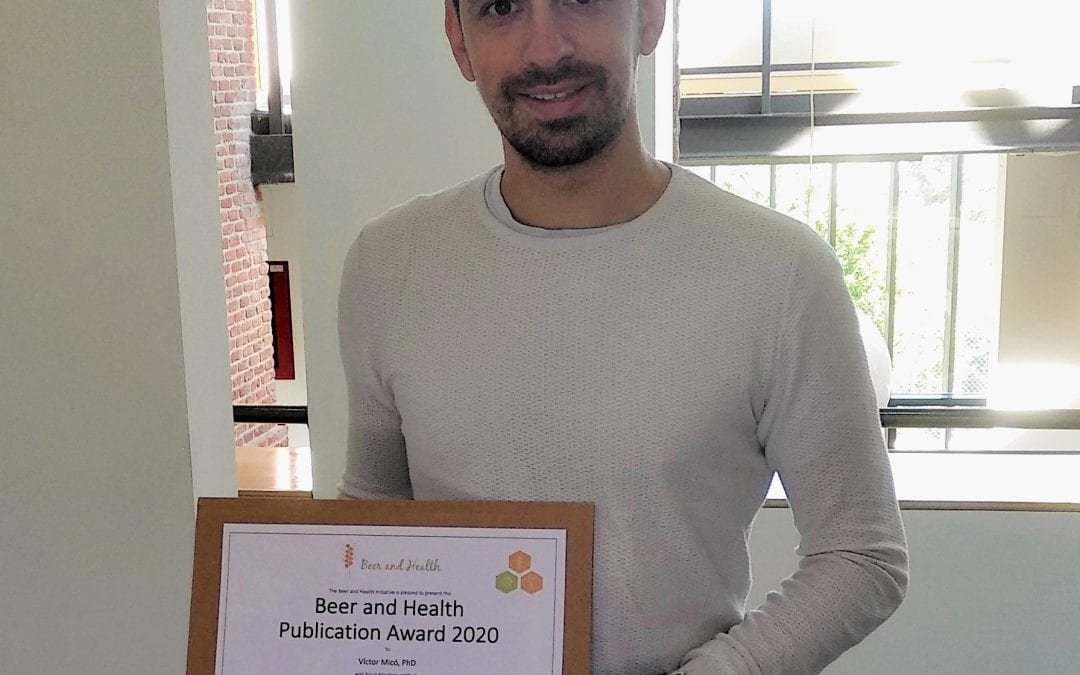Out of many applications from all over the world, the Scientific Committee of the Beer and Health Initiative elected Víctor Micó, a Spanish Postdoc at IMDEA Food Institute, as the winner of the Beer and Health Publication Award 2020. The quality of his study towards the effect of alcoholic and non- alcoholic beer on plasma and macrophage microRNAs in men with cardiovascular risk was outstanding and very original. Dr Micó receives a monetary prize of €1,000 and will present his research at the next Beer and Health symposium.
‘Very interesting basis for future studies’
There were a lot of good applications for the Publication Award 2020, but the study titled ‘Alcoholic and Non-Alcoholic Beer Modulate Plasma and Macrophage microRNAs Differently in a Pilot Intervention in Humans with Cardiovascular Risk’ send in by the shared-first author Víctor Micó, was outstanding.
“Even though this study is still in embryonic stage with a limited sample size, this paper stood out due to the quality of the research and the interesting and original method used. It is a very interesting basis for future studies, and we hope the authors keep up the good work”, says Prof Ramon Estruch, President of the Scientific Committee of the Beer and Health Initiative.
Interview Víctor Micó
Víctor Micó: “Most studies investigating the effect of beer focus on the traditional biomarkers: cholesterol, HDL, LDL, or general health status. Our research had a different vision; we wanted to get a deeper understanding of the mechanism. That is why we focused on how both beer and non- alcohol beer could affect genetic expression, specifically microRNAs that are related to cardiovascular disease, inflammation, diabetes, and obesity. The intervention of 500 ml beer a day lasted two weeks for both types of beer.”
Promising results
“It is a pilot study with seven participants, so we only have preliminary results, but the results are promising. We saw that beer and non-alcoholic beer have a very different effect on the microRNA profile. Non-alcoholic beer had a more anti-inflammatory profile, which is positive. But on the other hand, beer had better outcomes regarding cardiovascular risk reduction. The results are tricky: both beer and non-alcoholic beer had positive and negative health effects.”
Polyphenols
“We think that not only the alcohol in beer promotes the effects we saw. We analyzed the presence of the two main polyphenols in beer – 8-prenylnaringenin and isoxanthohumol – and we saw that beer had more isoxanthohumol than non-alcoholic beer while non-alcoholic beer had more 8- prenylnaringenin. These polyphenols could be part of the reason for the different results, not only the alcohol content.”
Further research
“Investigating genetic expressions is not cheap, but if we have the financial resources, we would like to extend the research with more participants to validate the results. If we had an unrestricted grant? It could be interesting to see if beer intake can affect the aging process. My impression is that beer, being a fermented beverage, if consumed in moderation may decrease the ageing process and thus positively affects the biological age.”
Selection process Award
The Technical Secretariat of the Beer and Health Initiative made a pre-selection based on the application criteria. The studies that fulfilled all criteria were further reviewed by three members of the Scientific Committee based on the originality of research question; quality of study design, conclusion/discussion, and writing; and on the contribution to the scientific understanding of the effect of moderate beer/alcohol consumption on health.
Next Publication Award
This was the first Beer and Health Publication Award. As it was a great success, the Beer and Health Initiative hopes to be able to offer it again next year.

